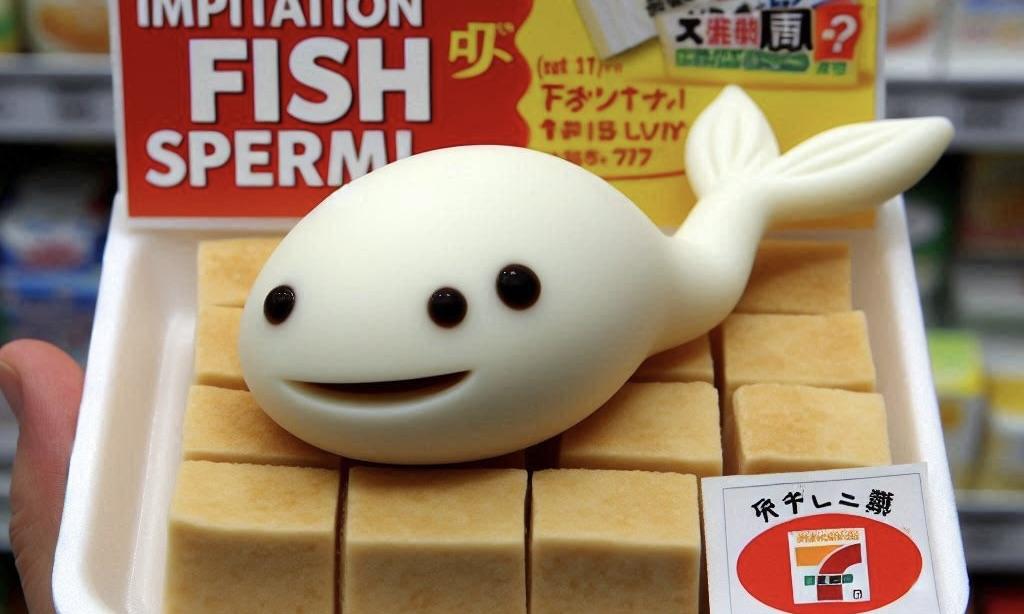Japan’s 7-Eleven is now offering a tofu-based imitation of shirako, or fish sperm, as part of Sagamiya Foods’ Beyond Tofu line. The plant-based delicacy, less intense in flavor, has surprised taste testers with its texture and mild fishy taste, providing an alternative to the controversial dish.
Plant-Based Imitation Shirako at 7-Eleven Japan Offers a Milder Take on the Divisive Delicacy
In Japanese, the phrase kuwazugirai refers to disliking something without having tried it, and it’s often applied to food. This means "to hate something without having eaten it," and Kuwazugirai describes the hesitation some people feel toward unfamiliar foods they might enjoy if given a chance.
According to SoraNews24, one such divisive dish is shirako or fish sperm. For many, eating shirako can evoke feelings of aversion, even if they've never tried it. Shirako sushi, the most common way to serve it, typically involves a generous portion of the creamy delicacy. Although it's relatively easy to find in Japan, shirako remains polarizing, and some, like Japanese-language reporter Snufkin, have politely declined every opportunity to try it.
However, Snufkin’s curiosity was piqued when she spotted imitation shirako made from tofu at her local 7-Eleven. This new addition to Sagamiya Foods’ Beyond Tofu line, including imitation uni (sea urchin), offers a plant-based alternative to shirako. Intrigued by the concept of tofu-based imitation fish sperm, Snufkin decided to try it, purchasing a pack for 246 yen (US$1.65).
Opening the package, Snufkin noticed a familiar scent reminiscent of imitation crab. Visually, the tofu-based shirako is less intimidating than the real thing, as tofu and shirataki have similar appearances. However, the tofu may be less off-putting for most people.
Tofu-Based Shirako Surprises with Unique Texture and Mild Flavor, Offering a Healthier Option
The shirako Beyond Tofu came with a packet of kombu (kelp) ponzu sauce, which Snufkin poured over the dish. After steadying her nerves, she took a bite—and was pleasantly surprised. Despite years of avoiding real shirako, Snufkin enjoyed the imitation version.
The texture was the first thing that stood out. Unlike regular tofu, the imitation shirako was sticky, with a smooth surface and finely fibrous quality. It was denser than typical tofu, more akin to gomadofu (sesame tofu), but it melted in her mouth. The flavor had a mild fishy quality, far less intense than she had feared, and to her surprise, the soy flavor from the tofu also came through, creating a surprisingly harmonious blend of fish and soy on her palate.
Curious about the health benefits, Snufkin checked the nutritional information. A 100-gram serving of real shirako contains roughly 60 calories, 0.8 grams of fat, and 0.2 grams of carbohydrates. In contrast, the same amount of imitation shirako clocks in at 184 calories, 14.9 grams of fat, and 6.9 grams of carbohydrates—more than triple the calories, 18 times the fat, and 34 times the carbs. However, the plant-based version offers one health advantage: it’s purine-free, making it a better option for gout, whereas real shirako has a high purine content.
Though Snufkin has never tried real shirako, she was impressed with the taste of the imitation version and now wonders if the real thing, which she has long avoided, might be something she would enjoy as well.



 Debate over H-1B visas shines spotlight on US tech worker shortages
Debate over H-1B visas shines spotlight on US tech worker shortages  Why a ‘rip-off’ degree might be worth the money after all – research study
Why a ‘rip-off’ degree might be worth the money after all – research study  Can your cat recognise you by scent? New study shows it’s likely
Can your cat recognise you by scent? New study shows it’s likely  The ghost of Robodebt – Federal Court rules billions of dollars in welfare debts must be recalculated
The ghost of Robodebt – Federal Court rules billions of dollars in welfare debts must be recalculated  The American mass exodus to Canada amid Trump 2.0 has yet to materialize
The American mass exodus to Canada amid Trump 2.0 has yet to materialize  Heritage, desire and diplomacy: why China still values scotch whisky
Heritage, desire and diplomacy: why China still values scotch whisky  Every generation thinks they had it the toughest, but for Gen Z, they’re probably right
Every generation thinks they had it the toughest, but for Gen Z, they’re probably right  Why financial hardship is more likely if you’re disabled or sick
Why financial hardship is more likely if you’re disabled or sick  Yes, government influences wages – but not just in the way you might think
Yes, government influences wages – but not just in the way you might think  Britain has almost 1 million young people not in work or education – here’s what evidence shows can change that
Britain has almost 1 million young people not in work or education – here’s what evidence shows can change that  Columbia Student Mahmoud Khalil Fights Arrest as Deportation Case Moves to New Jersey
Columbia Student Mahmoud Khalil Fights Arrest as Deportation Case Moves to New Jersey  Glastonbury is as popular than ever, but complaints about the lineup reveal its generational challenge
Glastonbury is as popular than ever, but complaints about the lineup reveal its generational challenge  Why have so few atrocities ever been recognised as genocide?
Why have so few atrocities ever been recognised as genocide?  Locked up then locked out: how NZ’s bank rules make life for ex-prisoners even harder
Locked up then locked out: how NZ’s bank rules make life for ex-prisoners even harder 































